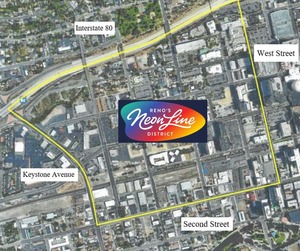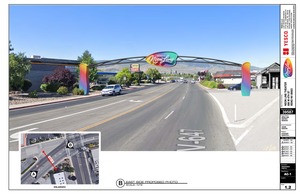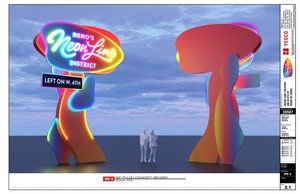(Published March 2022) Scenic Nevada is awaiting a district court judge’s decision on whether its lawsuit to void a development agreement between Jacobs Entertainment and the city will move forward or be dismissed.
Jacobs filed a motion on February 3 to have our case dismissed, trying to eliminate the chance for Scenic Nevada to present its arguments to Judge Connie Steinheimer in Department 4.
Scenic Nevada contends the development agreement is illegal under state law because it includes parcels within the project area Jacobs did not own when the agreement was approved by the council in a 6-1 vote. State law limits development agreements to land in which a developer has a legal or equitable interest.
The development deal struck last October covers the northwest quadrant of downtown which Jacobs is calling the Neon Line District and includes the area around west Fourth Street to Keystone Avenue. Proposals for three big, bright LED lit signs are part of the package of giveaways in the development agreement. We believe the signs the city and Jacobs agreed to match the definition of a billboard and violate Reno’s sign codes. The signs were part of the agreement approved by the council majority last October.

Initially, the city filed a motion to dismissalleging, among other things, that Scenic Nevada had no standing to sue and had not included the developers in the lawsuit. Read the city’s motion. Scenic Nevada’s attorney, Mark Wray, filed an amended complaint to include the developers and answering charges on standing. Amending the complaint made the city’s motion to dismiss moot.
Jacobs then filed its own Motion to Dismiss the amended complaint saying Scenic Nevada had no standing as well, and that we are not an “aggrieved” party whose personal rights or private property rights are affected.
Jacobs and the city reasoned that Scenic Nevada has no standing “because it did not appeal a lower body decision to the governing body.” State law requires potential litigants to object first at the planning commission and then appeal the decision to the council before they can petition the court.
But an appeal to the city council was never possible. Normally land use decisions are heard by the Reno Planning Commission which make recommendations to the council. But the council adopted an ordinance that development agreements come directly to the council, skipping a planning commission review. There was no chance for Scenic Nevada or anyone else to be heard at the planning commission and then appeal to the council.
The city and Jacobs’ twisted logic contends that because Scenic Nevada did not appeal the development agreement to the council, we are prohibited from filing a lawsuit under state law and our case should be dismissed.
Scenic Nevada filed its Opposition Motion February 17, pointing out that no one could ever sue under these circumstances, making a sham of the Nevada laws and Supreme Court decisions on when someone can object in land use decisions.
“This is not really a standing issue. It is an issue of the City adopting a procedure that does not allow a petition for judicial review to be filed by anyone,” our Opposition says. “In substance the City and the Developers seek to frustrate the Constitutional system of checks and balances by preventing the judicial branch from having any chance of reviewing the legality of land use decisions that may be contrary to the law.”
The development agreement is not a private arrangement between the Developers and the City. It is a public document that affects redevelopment of one-quarter of downtown Reno, put together with little public input and no real public planning, just the casino owner’s vision for a new entertainment district.
Scenic Nevada’s attorney anticipated that the city and Jacobs would try for dismissal to keep the real issues out of court, namely that the agreement violates state law and Reno’s sign codes. He included other possible remedies the court could use to review our case, like a petition for declaratory relief or a writ of mandamus.
In an equally twisted approach to the law, Jacobs said in its reply to our opposition February 24 that those avenues are blocked too because state law says we’re limited to a petition for judicial review – the exact remedy we tried to seek but they say we can’t file. That means, according to the city and Jacobs, no one, including Scenic Nevada can ever appeal a development agreement in Reno.
If the judge rules in Jacob’s favor there will be no decision in district court on the issues we raised in our lawsuit surrounding the development agreement, including the proposed signs, below.

Jacobs intends to build at least three signs and included renderings of the size, shape, height, lighting, and locations for them in the development agreement the city council approved. One is a 27-foot-tall archway sign that would span west Fourth Street, blocking a scenic mountain view which has one pylon located in the public right-of-way. The other two would be 25 feet tall with one facing Interstate 80 advertising the Neon Line District to passing motorists and the third positioned at the entrance of the proposed district at Keystone and West Fourth street. None of them would comply with Reno’s city codes which is why they were included in the development agreement – to circumvent the code.

Our motions show the judge that allowing the development agreement to stand would violate a 2017 Supreme Court mandated settlement agreement between Scenic Nevada, the city and billboard industry giant Lamar Advertising. No one can erect a billboard in Reno unless they can submit a preexisting unused billboard permit. All 26 in existence are owned by billboard companies and are set to expire by 2025, if they aren’t used.
Our Opposition also outlines for the judge the myriad reasons why we are an “aggrieved” party, whose personal rights are affected.
“Scenic Nevada’s personal right is based on its status as the author and defender of the ordinance banning new billboard permits and construction,” our Opposition states. “It is based on its role in enforcing the people’s vote, through all manner of administrative and legal proceedings over the past 20 years, when the Reno city Council refused to enforce the law. It is based on Scenic Nevada’s appearance in opposition to the approval of the Development Agreement at the October 13 and 27, 2021 City Council hearings. It is based on Scenic Nevada’s personal right in the Supreme Court settlement agreement which the City is now breaching by approving the Development Agreement and the three off-premises (billboards) approved therein.”
Our opposition also points out that City Attorney Karl Hall also agreed in 2015 during a sign issue for Summit Sierra Mall before the city council that we should be recognized as an “aggrieved” party.
“Under the circumstances, it would be consistent with the Code to recognize such an entity as aggrieved,” Hall wrote to the council at the time. “All citizens in Reno have a stake in aesthetics and safety and to say that only neighbors with a specific property interest being damaged can appeal a special use permit of this significance would defeat the purpose of (state law).”
Of course, our hope is that the Jacobs’ motion to dismiss is denied, giving Scenic Nevada its day in court. Thanks to all who continue to support our efforts through letters to the council and donations. If you have not yet renewed your membership or if you would like to become a member, please consider donating now. Thanks again.